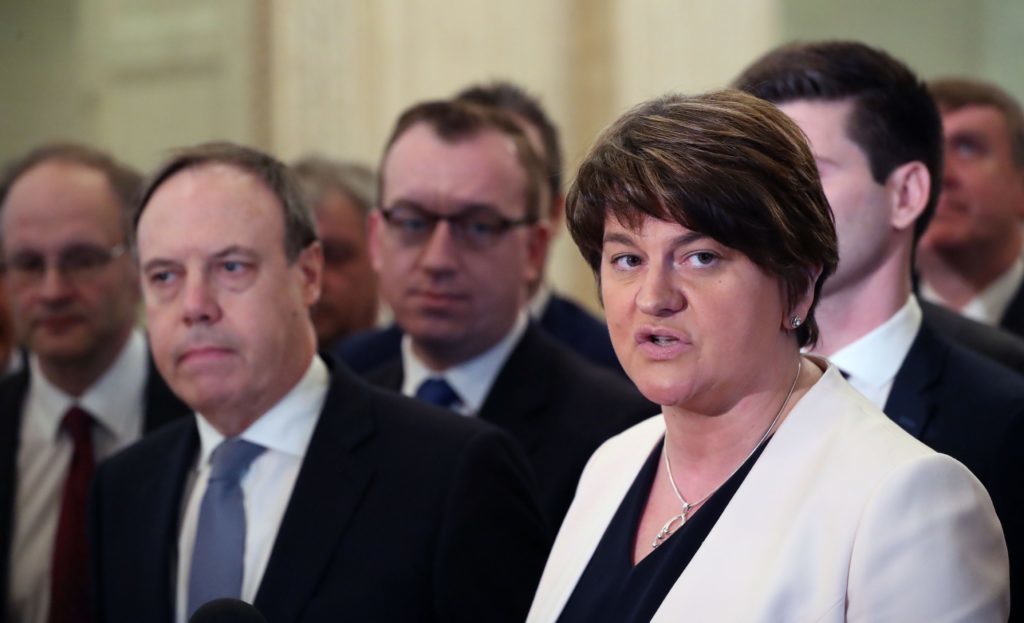
Sinn Fein has called for a scheme which was aimed at reducing carbon emissions, but ended up closing government at Stormont, to be scrapped.
Newry and Armagh MLA Conor Murphy described the Renewable Heat Incentive (RHI) scheme as a “sorry episode”.
The scheme hit the headlines in 2016 amid concerns over its costs.
A series of fatal flaws in the design of the RHI exposed Stormont to a huge overspend, as it ended up paying out more to applicants than it actually cost them to buy the fuel.
This created an impetus to “burn to earn”, and led to the scheme being dubbed “cash for ash”.
An ensuing political row saw Sinn Fein apportion blame to the DUP, whose leader Arlene Foster was minister at the former Department of Enterprise, Trade and Investment when the scheme was introduced to Northern Ireland.
Former deputy first minister Martin McGuinness resigned from his position in January 2017, effectively collapsing the Northern Ireland Assembly, in protest at the DUP’s “handling” of the scheme.
How the scheme went so wrong is currently being examined by an independent inquiry.
The RHI scheme continues to run with more cost controls.
The Department for the Economy ran a public consultation in June over the long-term future of the RHI scheme.
But Sinn Fein says in its response to the consultation that the RHI scheme should not continue in any form, arguing it is not effective in reducing carbon emissions.
Appearing at a press conference at Stormont on Thursday, Mr Murphy, flanked by party colleagues Mairtin O Muilleoir and Caoimhe Archibald, said they believe even with more cost controls, the scheme remains vulnerable to abuse.
Mr Murphy said the funding for the RHI scheme should be redirected into another scheme that would be more effective in cutting carbon emissions.
“RHI is not a good scheme that went wrong, it was a bad scheme that was made even worse,” Mr Murphy said.
“We are now aware that before the RHI scheme was set up, a report commissioned by the department showed that compared to an alternative scheme, this scheme was less effective in reducing carbon emissions and nearly £200 million more expensive.
“Despite this evidence the minister then responsible, Arlene Foster, opted for the less effective, more expensive option of RHI.
“The original error of establishing RHI was then compounded by incompetent design.”
Mr Murphy said his party believes if continued there is a risk that the scheme could be abused in the future, and says it should be shut down.
“Spending more public money on a scheme that is at best ineffective, and at worst counter productive to the goal of carbon reduction, cannot in our view be justified,” he said.
“The RHI scheme is fundamentally flawed and should be closed down.
“The money saved from RHI should be invested in a new scheme that is actually effective at reducing carbon emissions and tackling climate change which was the original intention of this sorry episode.”
The RHI inquiry remains ongoing at Stormont.
It was ordered by then finance minister Mairtin O Muilleoir in January 2017.
That came over a week after the resignation of Mr McGuinness, leading some to accuse Sinn Fein of flip-flopping on whether RHI should be subject to a full public inquiry or an independent investigation.
Speaking on Thursday, Mr Murphy said there are indications the inquiry is likely to hear more explosive evidence over the next few weeks.
When asked when Stormont might resume, Mr Murphy said his party intends to have ministers in place by next April 1, the start of the new financial year.
“Our intention is to have ministers in place by April 1, our intention is not to sit back here and allow the timetable of drift to be dictated by the British Government and the DUP in terms of their own Brexit interests,” he said.
